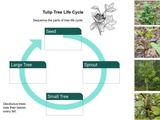
In this activity, participants plan and conduct a plant growth experiment while considering the role of data quality in automated systems in agriculture. The timing of the activity is highly dependent on the seed variety that you are growing and the level of familiarity that participants already have with basic plant science and scientific investigation concepts, but will likely take several weeks. This activity is part of the Agricultural Cyberbiosecurity Education Resource Collection that contains resources for formal and non-formal agricultural educators working with middle school aged youth. Published as Open Educational Resources, all resources are provided in durable (pdf) and customizable (MS Word) formats. They are hosted on GoOpenVA in a unique resource collection, Ag Cybersecurity Virginia Tech, at https://goopenva.org/curated-collections/143 and on on Virginia Tech’s stable repository, VTechWorks at https://doi.org/10.21061/cyberbiosecurity
- Subject:
- Agricultural Education
- Data and Analysis
- Living Systems and Processes
- Scientific and Engineering Practices
- Material Type:
- Lesson Plan
- Author:
- Ag Cybersecurity Virginia (VT)
- Date Added:
- 10/30/2023
